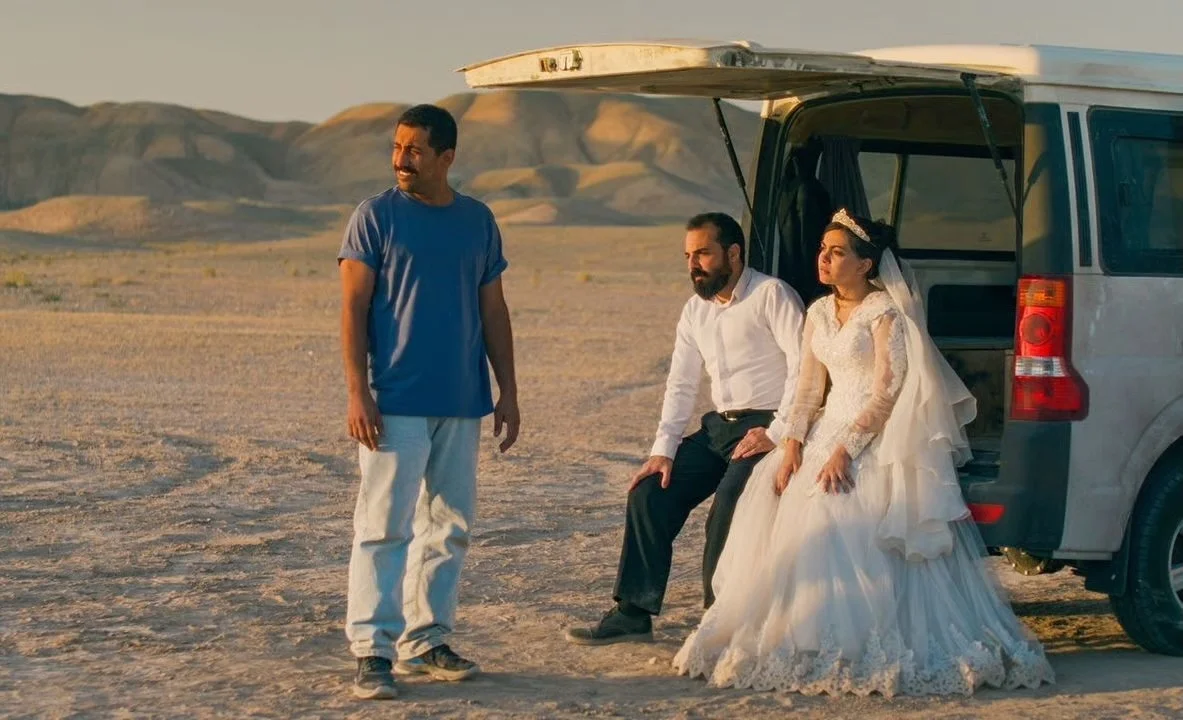Murder, She Wrote
The Talented Ms. Highsmith
"If you say in the first chapter that there is a rifle hanging on a wall, in the second or third chapter it absolutely must go off. If it’s not going to be fired, it shouldn’t be hanging there." --Anton Chekhov
Linda Reiter and Miles Blue in Switzerland at Renaissance Theatreworks. Photo by Ross Zentner
So what are we to make of the fireplace display in Joanna Murray-Smith's Switzerland—the opening show of Renaissance Theatreworks 2025-26 seasson—a mantle which boasts an impressive array of things sharp, shiny and explosive: revolvers, flintlocks, daggers, even sabers. That combination of Swiss orderliness and devilish camp might point those in the know to the work of Patricia Highsmith, the creator of the Ripley novels and an ardent fan of elaborate ways to kill people (in writing, of course). And sure enough, Highsmith is here, holed up in self-imposed solitude in the last year of her life. She suffers no fools, which isn't ideal for Edward, the publishing company underling who's been sent to get her to sign on a line that is dotted. The NYC suits want a new Ripley novel. She wants to be left alone.
She will have none of it. She is snarly and content in her fortress of solitude, surrounded by Alps and well provisioned with scotch, Campbell’s soup and peanut butter. Edward tries his earnest best to flatter and cajole her, but she is unmoving, as glacial as the ice floes visible from her apartment window. As Edward pleads and cajoles, Highsmith revels in her antipathy toward the "male literary establishment," which has treated her novels as mere "genre" fiction. Edward, on the other hand, is a fan, and his embarrassing fawning only sharpens Highsmith's serrated ire.
As you might guess, it's a feast for actors. Miles Blue shows Edward's slow transformation from fawning wannabee to savvy manipulator. Laura T. Fisher (an understudy who played Highsmith in the show I saw) is quick with a cynical snarl that only warms when the conversation turns to darker things. Like…..murder.
"I like murder," says Highsmith. "I've committed thousands. With delight. Every time I write one, I'm plunging in the knife." Here, Edward finds an "in." The pair find common ground trading murderous scenarios for the demise of Ripley's next victim. Highsmith, in fact, promises to sign the contract if Edward can imagine an interesting murder scenario for the proposed Ripley sequel. Soon, this pair of Übermenschen are bonding over scenes that would make Wes Craven squeamish.
And that, dear readers, is all I can say. For if you know Highsmith, you know that not everything is as it seems. Director Laura Gordon paces and orchestrates it perfectly so that the revelations land with a keen blend of shock and “Oh….I thought so.” It’s a delicious ride that will keep you guessing from scene to scene—and after the final blackout.
Switzerland plays at Next Act Theatre for one more weekend, closing November 9th.
Natural Wallpaper
Sure, you could look to your System Settings for an AI generated landscape. But why let your treasured iPad apps hang out on kitschy seashores or computer enhanced moonscapes. Here are some verifiable, actual “landscapes” that were found at my feet during some recent October strolls. Makes me sigh with “touch grass” contentment every time I come searching for a new online crossword. Feel free to download for your own home screen.
Robbie Blue
Back in February, my jaw dropped watching Doechii perform at the Grammy Awards in an amazing piece of dance-theater—Bob Fosse meets hip-hop meets Soul Train. I searched the Grammy website in vain for name of the choreographer, but no luck. I cursed and smirked at the pop-music star system that puts one artist on a pedestal while leaving some of the creativity behind their work uncelebrated.
Doechii’s 2025 Grammy Awards performance, choreographed by Robbie Blue. Photo by Sonja Flemming.
Well, I obviously didn’t look hard enough. The choreographer behind that number was Robbie Blue, who was featured and feted in a recent New York Times “Critic’s Spotlight” by Gia Kourlas.
Browse that article for a dance critic’s take on Blue’s innovative movement vocabulary, but don’t neglect sampling some of his videos for yourself: “Better in Denim", an ad for The Gap, and “DANCE DANCE SHIMMY CELEBRATION EXTRAVAGANZA,” which is too outré to be an ad for anyone but Robbie Blue.
It Was Just an Accident
Mohamad Ali Elyasmehr, Madjid Panahi, and Hadis Pakbaten in It Was Just an Accident.
Jafar Panâhi’s latest feature—winner of the Palme d’Or at the Cannes Film Festival—is by turns hilarious and harrowing. At times, it has a screwball affinity to It’s a Mad, Mad, Mad, Mad World, as it sends a conglomerate crowd of acquaintances on a madcap road trip. This group, however, is not after a mysterious hidden treasure. They are all former Iranian political prisoners who were brutally tortured by an Iranian guard named Eghbal (Ibrahim Azizi). They are seeking revenge.
Vahid Mobasseri
Eghbal is first discovered by Vahid (Vahid Mobasseri), an auto mechanic who recognizes the tell-tale squeak of Eghbal’s artificial leg. He follows him, kidnaps him, and is prepared to bury him alive until his prisoner convinces him that he has the wrong man. Vahid sets out to find other former prisoners—with Eghbal tied and locked up in the back of his beat-up van—who can confirm Eghbal’s idenity. And so the group grows: a wedding photographer (Mariam Afshari), a bride and groom (Madjid Panahi and Hadis Pakbaten), and the photographers hotheaded ex (Mohamad Ali Elyasmehr).
Panâhi himself spent time imprisoned in Iran for “propaganda against the state,” most recently in 2022, when he was imprisoned for 7 months and subjected to blindfolded interrogation. It is said to have inspired this film and he based these characters on people he met while serving time. One of the most celebrated filmmakers in world cinema, he skillfully balances the tone and genre conventions of his story, but never lets you lose sight of what’s at stake and what’s behind the group’s mission. As the film goes on, Pahani lets the wrenching moral questions slowly bleed through as the passengers debate what to do with Eghbal. Are the tortured becoming the torturers? What if certainty is impossible? Is the proper response one of revenge or mercy? In the searing climax, the questions give way to pure rage that is captured in a devastating scene—a single take lit in the hellish red glow of the van’s brake lights. Never a storyteller given to simple resolutions, Panâhi follows that scene with an unsettling and simple coda that chills you as the credits roll.
Artemis
I’m teaching an adult-ed, jazz appreciation course, which focuses on the legends of the music—Louis Armstrong, Charlie Parker, Duke Ellington, John Coltrane. So yes, I’ve been immersed in the mostly male canon of jazz in the 20th century. But the jazz music scene in the last 30 years has seen a burgeoning of female talent, so in my final class, I’ll be championing the music of Artemis, the female “super-group” who just released their third album, Arboresque. They are inventive and eminently listenable. Here’s a taste of their music from an NPR “Tiny Desk” concert.











